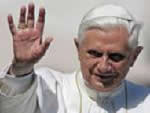|
Pope Benedict XVI- Angelus |
 Angelus
Message
Angelus
Message
On Zacchaeus the Tax Collector
"Love ... Is the Force That Renews the World"
H.H. Benedict XVI
November 4, 2007
www.zenit.org
Dear Brothers and Sisters!
Today the liturgy presents the well-known Gospel episode of Jesus'
meeting with Zacchaeus in the city of Jericho. Who was Zacchaeus? A
rich "publican," that is, a tax collector for the Roman authorities,
and precisely for this he was regarded as a public sinner.
Knowing that Jesus was passing through Jericho, this man was seized
by a great desire to see him but, being small of stature, he climbed
a tree. Jesus stopped beneath the tree and turned to him, calling
him by name: "Zacchaeus, come down quickly, for today I must stay at
your house" (Luke 19:5).
What a message in this simple phrase! "Zacchaeus": Jesus calls by
name a man who is despised by all. "Today": Yes, his moment of
salvation is now. "I must stay": Why "must"? Because the Father, who
is rich in mercy, wants Jesus to go and "seek out and save what was
lost" (Luke 19:10).
The grace of that unforeseeable moment was such that it completely
changed Zacchaeus' life: "Behold," he confesses to Jesus, "half of
my possessions, Lord, I shall give to the poor, and if I have
extorted anything from anyone I shall repay it four times over"
(19:8). Once more the Gospel tells us that love, flowing from the
heart of God and working through the heart of man, is the force that
renews the world.
This truth shines forth in a singular way in the witness of the
saint whose feast falls on this day: Charles Borromeo, archbishop of
Milan. The figure of St. Charles rises up in the 16th century as the
model of the pastor known for his exemplarity in charity, doctrine,
apostolic zeal and above all prayer: "We conquer souls," he said,
"on our knees."
Consecrated bishop when he was only 25, he put into practice the
decree of Trent that demanded that bishops reside in their diocese,
and he dedicated himself entirely to the Ambrosian church: three
times he visited the entire diocese; he called six provincial synods
and 11 diocesan synods; he founded seminaries to form a new
generation of priests; he built hospitals and gave his family's
wealth to the service of the poor; he defended the Church's rights
against the powerful; he renewed religious life and instituted a new
congregation of priests, the Oblates.
In 1576, when the plague was wreaking havoc on Milan, he visited and
comforted the sick and gave all his goods to them. His motto was a
single word: "Humilitas." Humility moved him, as it did the Lord
Jesus, to renounce himself to become the servant of all.
Remembering my venerable predecessor John Paul II, who with devotion
bore St. Charles' name, let us entrust to the intercession of St.
Charles all the bishops of the world, for whom we invoke as always
the celestial protection of Mary Most Holy, mother of the Church.
[After praying the Angelus, the Holy Father greeted pilgrims in six
languages. In Italian, he said:]
The news that we have received in these last days about the events
in the border area between Turkey and Iraq are a source of concern
for me and for everyone. I desire, thus, to encourage every effort
to reach a peaceful solution to the problems that have recently
emerged between Turkey and Iraqi Kurdistan.
I cannot forget that in that region numerous people, fleeing from
the uncertainty and terrorism that have made life in Iraq difficult
in these years, have found refuge. Precisely for the good of these
people, among whom are many Christians, I strongly desire that all
the parties involved work for peaceful solutions.
I desire, furthermore, that the relations among the migrant
populations and the local populations develop in the spirit of that
high moral civility that is the fruit of spiritual and cultural
values of every people and country. May those who are in favor of
security and hospitality know how to use the appropriate means to
guarantee the rights and duties that are the foundation of all true
common life and encounters among peoples.
[Translation by ZENIT]
[In English, he said:]
I happily greet all the English-speaking pilgrims gathered for this
Angelus. In today's liturgy, the Book of Wisdom tells us that the
Lord has "mercy on all" because he is a "lover of souls" (Wis 11:23,
26). My dear friends, may God's word and your visit to this holy
city inspire you to share Jesus's love and mercy to everyone you
meet. I wish a joyous Sunday to all!
© Copyright 2007 -- Libreria Editrice Vaticana
This page is the work of the Servants of the Pierced Hearts of Jesus and
Mary